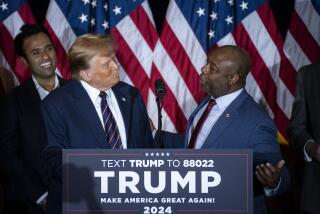For Watts, Achievements, Not Race, Are in Foreground
- Share via
WASHINGTON — He’s young--only 41--and a former University of Oklahoma football star. He’s charismatic--an articulate and, some say, even inspirational speaker. He’s a conservative Republican. Incidentally, he’s also black.
That’s how Rep. J. C. Watts Jr. (R-Okla.) would describe what he brings to the House GOP’s fourth-ranking leadership post after his election Wednesday as chairman of the House Republican Conference, the group that maps legislative strategy for the GOP.
“I’m not running as a black candidate”--only as a Republican--he said before the balloting Wednesday. And after the count, he insisted again that he had not run based on his skin color but “on what I hope to bring and propose to do for our conference.”
But there’s little doubt that both Watts and the House GOP leadership also hope that the choice will broaden the party’s appeal to African American voters and help get its message across more effectively.
“I think it’s good for the Republican Party to know that we’re a party of men and women--red, yellow, brown, black and white Americans,” Watts told reporters after his election Wednesday.
Frank Luntz, the GOP pollster, said that the worst dilemma plaguing the GOP in the Nov. 3 election was the lack of an effective spokesman to bring the party’s message to voters. “With J. C. Watts” on the job, “that problem has been solved,” Luntz said Wednesday.
The only black Republican in Congress, Watts--who coincidentally celebrated his birthday Wednesday--would seem to have all the attributes of a poster-child for what some GOP strategists hope will be the party’s new, presumably more successful image.
Born into a poor family in rural Oklahoma, Julius Caesar Watts Jr. switched to the Republican Party after attending a 1980 debate in which Sen. Don Nickles (R-Okla.) advocated tax cuts and school vouchers to address the problems of the inner city.
Watts said he decided such conservative staples closely reflected the principles of responsibility and self-reliance he had been taught at home by his father, a policeman and weekend minister, and his mother. And he has not wavered since.
While urging the GOP to go slow in dismantling federal affirmative action programs, he nevertheless has criticized them as counterproductive. And he has backed hot-button conservative issues, including education vouchers.
Such stands often have sparked angry denunciations from such traditional civil rights leaders as the Rev. Jesse Jackson and NAACP Chairman Julian Bond but Watts--a former real estate and oil-industry entrepreneur--has carefully avoided escalating the dispute.
But his stance has played well in other quarters.
Although Watts’ district is 83% white and historically Democratic, he won election to Congress in 1994 with 52% of the vote, increasing it to 58% in 1996. In the latest election, two weeks ago, he won a 62% majority, despite a mini-scandal over unpaid debts and taxes.
Rep. Rick A. Lazio (R-N.Y.) told reporters Wednesday that Watts’ unusual combination of attributes makes him a valuable asset for the GOP. “He’s a compassionate conservative . . . and knows how to help people who have been mired in poverty,” Lazio said.
While Watts has periodically protested playing the role of “the black Republican,” he also has made the most of it. He was a speaker at the GOP convention in 1996. The next year, he gave the GOP response to President Clinton’s State of the Union speech.
Over the last several years, he has averaged 50 to 100 speaking invitations a week, regularly traveling to appear at fund-raisers across the country. He has been mentioned as a possible vice presidential candidate.
Married, with five children ranging from 7 to 21 years old, Watts has said repeatedly that his personal credo was imbued in him by his parents--one of hard work, equality of opportunity, personal responsibility and a strong, unflinching presence of family and church.
Despite his discomfort over emphasizing the race issue too openly, Watts has been something of a barrier-buster over the years.
He was the first black to become quarterback of the Eufaula, Okla., high school football team, the first black member of the Oklahoma Corporation Commission and the first black Republican congressman from below the Mason-Dixon line since Reconstruction.
Nevertheless, he clearly is aiming for broader targets right now. “I don’t do things to be symbolic,” he told an interviewer once. “I do things to make a difference.”
More to Read
Get the L.A. Times Politics newsletter
Deeply reported insights into legislation, politics and policy from Sacramento, Washington and beyond. In your inbox twice per week.
You may occasionally receive promotional content from the Los Angeles Times.










